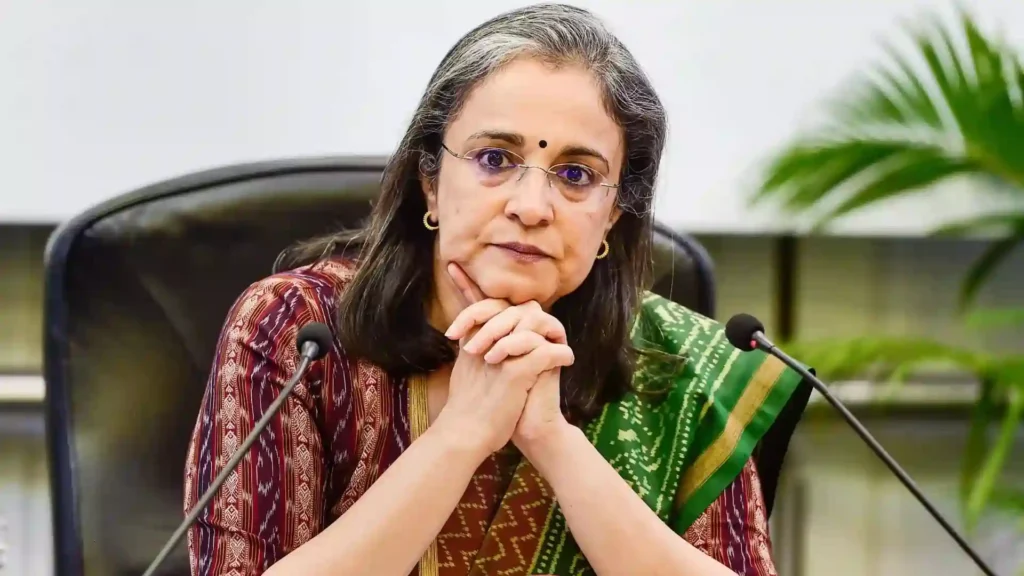SEBI chairperson Madhabi Puri Buch faces allegations of conflicts of interest and questionable foreign investments. Further, the Congress party has criticized her for investments in Chinese funds, potentially violating SEBI's transparency rules.
SEBI Chairperson Madhabi Puri Buch

New Delhi, September 14, 2024: Madhabi Puri Buch, the chairperson of the Securities and Exchange Board of India (SEBI), is facing serious allegations regarding conflicts of interest and inappropriate foreign investments. The Congress party has expressed apprehensions regarding Buch’s financial transactions, especially her investments in Chinese funds, which may contravene SEBI’s regulations concerning conflicts of interest and transparency.
Allegations of Foreign Investments and Conflict of Interest
Pawan Khera, a spokesperson for the Congress Party, has accused Madhabi Puri Buch of participating in substantial business dealings involving listed securities valued at approximately 36.9 crore from 2017 to 2023, which are associated with foreign investments and potential conflicts of interest. During this timeframe, Buch held the positions of full-time member and subsequently chairman of SEBI. The Congress Party claims that these transactions encompass investments in various Chinese financial instruments, including the Vanguard Total Stock Market ETF, ARK Innovation ETF, Global X MSCI China Consumer ETF, and Invesco China Technology ETF.
These investments are particularly significant given the ongoing geopolitical tensions between India and China. Emphasizing this geopolitical backdrop, Khera remarked: “India has historically been wary of Chinese products and investments. In light of the current discord between China and India, how can a senior official such as the SEBI chairman justify investing in China? Additionally, the speaker expressed concerns regarding the Prime Minister’s policies related to PMCARES funding.”
Conflict of Interest and Allegations of Insider Trading
The Congress has raised three pointed inquiries directed at Prime Minister Modi:
- Is the Prime Minister aware that the Chairperson of SEBI engaged in securities trading while possessing Unpublished Price Sensitive Information (UPSI)?
- Was he informed about Buch’s substantial investments abroad, and if so, when were these details made public?
- Did the Prime Minister have knowledge of Buch’s investments in Chinese companies despite the prevailing geopolitical tensions?
These allegations emerge amid a wider wave of criticism directed at Buch and her spouse, Dhaval Buch, who are accused of having interests in offshore funds associated with the Adani Group. The claims gained momentum following a report by the US short-seller Hindenburg Research, which alleged that Buch and her husband were involved in dubious financial practices and potential conflicts of interest.
Denial of Allegations by Madhabi Puri Buch
In light of the allegations made against her, Madhabi Puri Buch and her spouse provided a robust counterstatement, unequivocally rejecting all accusations. In a declaration issued on Friday, September 13, Buch characterized the claims as “false, malicious, and defamatory.” She affirmed her adherence to all SEBI disclosure and recusal protocols, asserting her commitment to transparency in her professional conduct.
Buch further indicated that the income tax returns, which form the basis of several of these allegations, had been acquired through illicit means. “This constitutes not only an infringement of our right to privacy but also a violation of the Income Tax Act,” she remarked. Additionally, she highlighted that the narrative constructed around her actions was intentionally misrepresented to tarnish both her reputation and that of SEBI.
Previous Allegations and Ongoing Investigations
The debate surrounding Buch is not a recent development. Earlier this year, the Congress party asserted that Buch continued to receive financial advantages from her previous employer, ICICI Bank, even after her retirement. In response, ICICI Bank refuted these allegations, clarifying that Buch had not received any form of compensation or stock options since her retirement in 2013, aside from standard retirement benefits. Furthermore, the Congress party claimed that Buch’s spouse had ties to Agora Advisory Private Limited, a firm that allegedly offered consultancy services to companies currently under the scrutiny of SEBI.
Moreover, the Congress party accused Buch of gaining financially from rental income associated with a property leased to a subsidiary of Wockhardt, a pharmaceutical company that is presently under investigation by SEBI. In her defense, Buch stated that she had no connection to the SEBI investigations concerning Wockhardt, as these issues were managed by other officials in accordance with SEBI’s Delegation of Powers framework.
Congress’s Continued Criticism
Despite Buch’s denials, the Congress remains steadfast in its accusations, with spokesperson Pawan Khera demanding full transparency on the SEBI Chairperson’s financial dealings. The party also continues to question SEBI’s impartiality, particularly in its handling of high-profile cases like the Adani Group investigation. According to Khera, the fact that Buch held significant stakes in offshore funds and Chinese ETFs raises serious questions about the integrity of India’s market regulatory framework.
Broader Implications and Public Reaction
The accusations directed at Madhabi Puri Buch carry substantial consequences for the credibility of SEBI and the overall financial regulatory environment in India. This scrutiny has prompted inquiries into the integrity of SEBI’s operations and its capacity to enforce regulations without bias. The current controversy underscores the necessity for transparency and accountability within regulatory institutions, particularly during periods of geopolitical and financial instability.
As the situation progresses, both the political and financial sectors are attentively observing the developments. The primary concern is whether the allegations against Madhabi Puri Buch will result in additional investigations or actions that may influence the regulatory framework in India.

